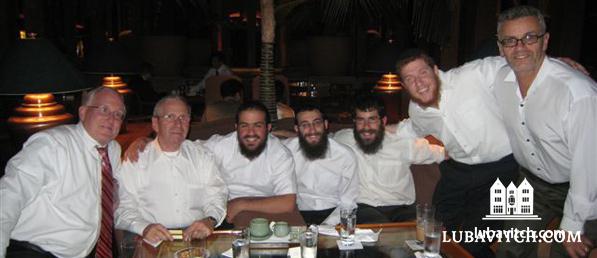(lubavitch.com) A simple melody can resonate more powerfully than the most profound sermon or even a moving service.
So says Rabbi Avi Lesches, at least. Lesches and three other rabbis were in Seoul last month to assist with High Holiday activities at an American army base. One afternoon, the quartet started to sing the soulful melodies famous in Chassidic circles. Several days later one of the soldiers revealed the music’s full impact.
As he later told the Rabbis, it was during Rosh Hashanah services that he remembered that that his father is a Kohen (priest). He began to regret his relationship with his non-Jewish girlfriend. He felt he should end it, but wasn’t sure he could. It took the melodies he would hear a few days later to strike a chord in his soul: I am Jewish, I am a priest, and this relationship will never work. The next day it was over. And the soldier was thanking the rabbis.
Lesches and his colleagues, Rabbi Shmuli Nadler, Levi Pekar and Yossi Goldstein, were based at the Religious Retreat Center, operated by the United States Military in Seoul. They came at the behest of U.S. chaplain Rabbi Avi Shulman and Chabad representative Rabbi Osher Litzman.
Approximately 200 Jews are among the 30,000 soldiers posted in Korea. There is also a civilian Jewish population of 200, most of them English teachers and businesspeople.
As a society, Koreans identify with the Jewish people and Israel. Like Israel, Kore, too, is surrounded by hostile neighbors. An astounding seven percent of Koreans register themselves as Jewish, and Korean translations of the Talmud circulate throughout the country.
“They look at the Jews as a model to copy,” says Litzman of the Koreans.
Until Litzman arrived to serve the broader Jewish community last year, the only Jewish address available was the military chaplain (when there was one stationed in the country). Now, the Litzmans run a full Chabad center, working in conjunction with Shulman.
In honor of Rosh Hashanah and Yom Kippur, a section of the base was reserved for prayer services and holiday events. The military also provided a large kitchen, which the rabbis koshered for meal preparation. As many of the soldiers work up to two hours away (via bullet train), the rabbis arranged for sleeping quarters. More than a dozen took advantage of the opportunity, spending the entire Rosh Hashanah with the rabbis on base.
Last year, Litzman’s first in Korea, the Rabbi noticed that the soldiers and community members were unfamiliar with the Hebrew liturgy and had a difficult time connecting with the prayers. This year, he says, with the addition of stories and explanations, “we saw that people stayed for a lot longer and came back for more.” Lesches concurs.
“It was not just lip-service and then go home,” he says. “It was an inspiring experience for everyone.” After the services and kosher meals, the soldiers relaxed with the rabbis in their quarters.
“They made a lot of friends,” says Shulman. “I saw them sitting out there talking to people day and night, the whole time they were here.”
“It came as a big shock to them that we aren’t some narrow-minded, ultra-conservative men,” affirms Lesches. “It was a good chance for them to meet Orthodox rabbis who weren’t forcing them to come to services or dress in a certain way.” The relationships went beyond the synagogue and army base to Seoul’s streets, coffee shops and taverns.
“I did not expect to find myself at an Australian-themed saloon in Itaewon, immediately upon the conclusion of Shabbos, with the four rabbis, discussing both religious and secular topics,” says Robert Feldmeier, a Judge Advocate officer with the American military. “I think that experience showed some of the other Soldiers who were present that observance is not incompatible with modernity and with the diversions which interest young people in the secular world.”
Feldmeier, 30, began his own religious journey during an eight year term in the American army. He credits Chaplain Shulman, who was with him in Iraq and now Korea, “with lighting that fire.”
The young rabbis, he says, have spurred him to even greater growth. “I would hope that the fire of Torah which burns within those young rabbis might one day burn as brightly within my own heart.”
For his part, Lesches was inspired by this small Jewish contingent. “They are so far from the base of Judaism and yet they are such a warm, thriving community.”

Be the first to write a comment.